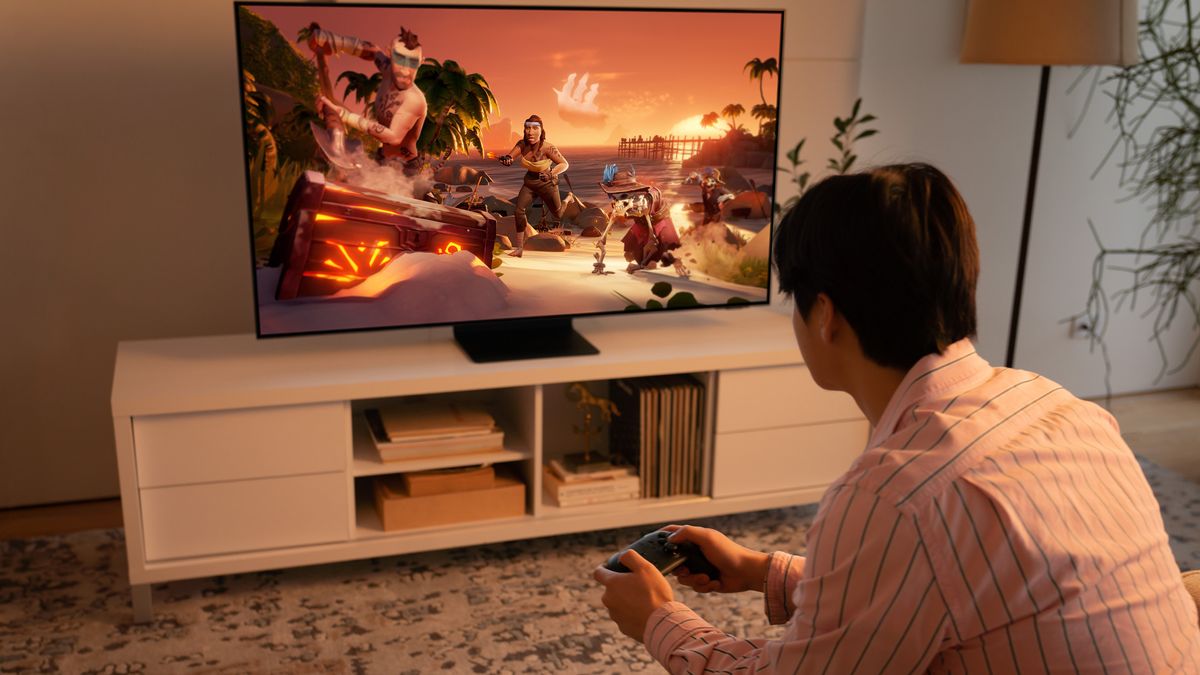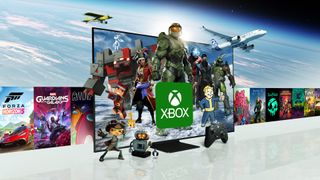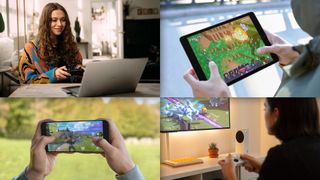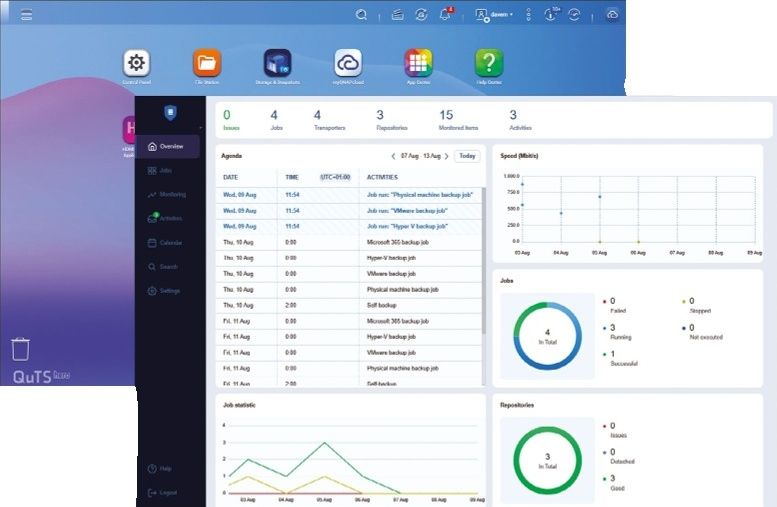Xbox Game Pass on Samsung TVs feels like cloud gaming’s tipping point
Blue sky thinking

Ever since Microsoft launched Xbox Cloud Gaming, a console-less future for Xbox has been on the cards. Today’s news that Samsung Smart TVs will be able to stream Game Pass Ultimate through the Samsung Gaming Hub app is our first real glimpse at what that future looks like.
As part of its What’s Next For Gaming briefing, Microsoft announced that from June 30, Samsung 2022 Smart TVs will feature a Samsung Gaming Hub app that will let you stream any Xbox Cloud Gaming enabled games on a Game Pass Ultimate account to your television and play them with a controller connected via Bluetooth.
While the game catalog available through Xbox Cloud Gaming is more limited than the full Xbox Game Pass library, that still sets you up with more than 100 games to stream directly to your TV.

Microsoft corporate vice president Ashley McKissick confirms that this partnership with Samsung is just the first that the company is planning, saying its “intent is to explore other TV partnerships as part of this next evolution in our vision”.
If you don’t already have an Xbox and were planning on picking up a new Samsung TV this year then this may be the icing on the cake. Or, you might have a second television set up for a more dedicated gaming space, and this Game Pass-streaming Samsung TV would be for occasional gaming in the main living room. Either way, that’s lovely, but it’s not the big picture.
Microsoft wants to make Game Pass accessible on any screen without dedicated hardware. Consoles and gaming PCs aren’t obsolete; having a powerful machine running games right next to the screen you’re playing them on currently has many advantages over Cloud Gaming. Picture quality and controller latency are still significantly better when playing games on a dedicated machine. But, thanks to Xbox Cloud Gaming, you can play games on your phone, tablet, and now television without a single piece of additional kit.

Until a few months ago I’d never seen how Cloud Gaming fit into how I played games – I had a gaming PC and multiple consoles, including a Switch I could take with me on the move. Why would I also need to stream games to a device, especially when the feed quality could be inconsistent? The only real advantage seemed to be that you cut out the time spent installing a game and loading saves.
That changed when I got Covid back in January and found myself self-isolating at my parents’ for ten days without any of my consoles. All I had was an underpowered laptop that could just about run Slay the Spire. It was only then that the use of cloud gaming clicked for me. I ordered an Xbox controller on next-day delivery and spent the eight remaining days playing through games like Halo Infinite and Star Wars Jedi: Fallen Order, titles my laptop wouldn’t have had a hope of running.
Currently, Cloud Gaming opens the door to games you can’t play on low-powered devices. But as the technology improves, I can see it making console ownership the rarity, not the norm for gamers.

I remember back in 2004, when Half-Life 2 launched and forced you to install Steam to play the shooter, a friend said that he’d always buy physical games because his capped internet made downloading them impossible. Then, over the years, internet speeds improved, download caps increased, and now the digital game market has overtaken physical sales. This feels like the same moment for cloud gaming.
Microsoft is only going to increase its penetration of the screen space with time. More television manufacturers will offer native gaming hub apps. And, in the interim, we know that Microsoft is working on an Xbox Streaming Stick that you will be able to plug into any television and start playing the best Xbox Game Pass games. Cloud gaming is going to become more available, more standardized, and simply more familiar.
The question is, will there come a time when the streaming experience is so good that it will make sense for Microsoft to stop producing hardware and focus solely on the software? Maybe there’s a ceiling on how good cloud gaming will become and dedicated tech will always hold the edge. Maybe not.
Finally, how will Sony respond to this move by Microsoft? It’s already explored streaming through Playstation Now, a service it’s collapsing into the new look PS Plus that’s launching later this month. With Sony releasing more of its exclusives on PC, it’s clearly open to seeing its software run on non-Sony devices. Could we see it stream its PS Plus catalog to smart TVs and phones as Microsoft is doing? Once it seemed inconceivable; now, with the promise that half of PlayStation’s first-party games will be on PC and mobile by 2025, you wouldn’t bet against it.
All this is to say you shouldn’t be quick to dismiss cloud gaming. With companies like Microsoft and Samsung putting this much effort into making it work, it’s here to stay.
Get daily insight, inspiration and deals in your inbox
Sign up for breaking news, reviews, opinion, top tech deals, and more.

Julian's been writing about video games for more than a decade. In that time, he's always been drawn to the strange intersections between gaming and the real world, like when he interviewed a NASA scientist who had become a Space Pope in EVE Online, or when he traveled to Ukraine to interview game developers involved in the 2014 revolution, or that time he tore his trousers while playing Just Dance with a developer.












